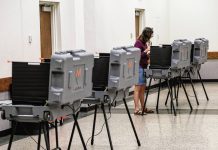EDINBURGH — Edinburgh Community School Corp. has received a Science Technology Engineering (STEM) Acceleration Grant from the Indiana Department of Education (IDOE) for almost $50,000.
Anya Cutter, an intermediate special education teacher at East Side Elementary, said the the grant money will go toward after-school activities such as robotics training and possibly Lego competitions for younger kids. She also said that the school has been collaborating with the fire department and police department to consider the possibility of a drone training program.
“There were over 100 applications, so we feel very fortunate that we got one,” Cutter said. She also stated that while the grant runs through the summer of 2021, the state is allowing them flexibility and allowing them to get extensions on the contract.
Cutter said that this grant builds on an earlier STEM Acceleration Grant that the school system received in December of 2019.
“It’s like a progressive movement, or I like to think of it as a pyramid,” she said. “We first start our foundation and then we build on it from there. So, for example, if the teachers went through project-based learning and training with professional development, they’ve now reached the skill level to present that to the classroom. And then from the classroom, they’ll present it and do after-school activities with the students.
This first grant was for almost $50,000 and went toward Project Based Learning (PBL) curriculum and teacher training.
PBL is defined by the Buck Institute for Education as “a teaching method in which students gain knowledge and skills by working for an extended period of time to investigate and respond to an authentic, engaging, and complex question, problem, or challenge.”
Little did the school corporation know that, just a few months after receiving this first grant, they would face complex questions, problems and challenges of their own.
Originally, ECSC planned to have the presenters for their PBL training appear in person. However, with school doors closed for e-learning in the wake of COVID-19, they were forced to change their plans.
“We had to, you know, rethink the process of how we’re going to do Project-Based Learning virtually,” said Cutter. “And that is not easy, because it’s inquiry-based, lots of discussion, and usually you have an overlying question that you’re looking to answer through students’ input. And then there’s research and, you know, it’s just, it’s student-centered. So when you have to do elearning, and elearning is more or less teacher-directed, it poses quite a few problems.”
Cutter and 21 other teachers did their PBL training over Zoom on June 2 and 3. There will be a follow-up session in July to go over their assigned PBL projects. The training included breaking up into small discussion groups, completing independent work outside of Zoom and presenting that work for feedback, both in small groups and the whole group. Cutter said that in spite of the virtual format, she thought the training went well and was more effective than just listening to a lecture. She added that the teachers discussed solutions to real-world problems during their training.
“We talked about world hunger,” Cutter said. “And to break that down into a part for our school, you know, we talked about kids that are hungry on the weekend, weekend hunger. And what can we do as a group to solve that problem. And just as teachers, you know, we were thinking about possibly putting in, you know, a food pantry in our school.”
Cutter said that one of the school’s goals, as it seeks to become “STEM certified”, is to involve all of ECSC’s students in PBL and have them complete a “rigorous STEM project” during the 2020-21 school year, which may involve students finding ways to help their local community.
“Kids are very, very creative,” Cutter said. “We just, sometimes, don’t give them the opportunity to be. And I think that’s what STEM does. It just creates that environment for them. And it prepares them, to me, for lifelong learning and for working in the workforce.”
She noted that most jobs, regardless of industry, require “collaboration and inquiry-based research.” She also said that, in her 43 years of teaching, she’s found that hands-on learning such as PBL does a better job of engaging students and creating a long-term memory than a typical lecture would.
“I think (STEM) just opens the world up to the kids,” Cutter said. “We’re at about a 74% free and reduced lunch at our school, so, you know, for some of those kids, the big city is Columbus, Indiana. And by opening up the real world situations, I think we’re preparing them more for their future, especially in the work world.”




